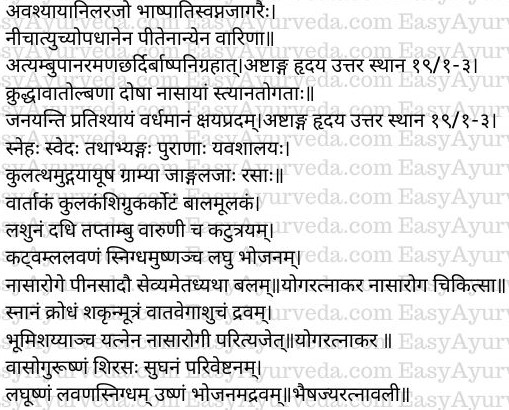Nasal Disorders Causes, Pathogenesis, Treatment In Ayurveda
By Dr Raghuram Y.S. MD (Ay) & Dr Manasa, B.A.M.S
Nasal disorders are diseases related to the nose. In Ayurveda nasal disorders are termed as Nasa rogas. There are many diseases classified under Nasaghata rogas. This article includes common causes, pathogenesis and treatment of Nasa rogas.
Table of Contents
Causes

- Avashyaya – excessive exposure to the air filled with snow / fog / mist
- Anila – excessive exposure to breeze
- Raja – excessive exposure to dust includes minute dust or smoke
- Ati Bhasya – excessive speaking
- Ati swapna – sleeping in excess / sleeping during day time
- Ati jagaraih – keeping awakened all through the night regularly
- Nicha-ati uchcha upadhana – sleeping without using pillow or head low position or high head position
- Pitena anyena varina – drinking water at different places and drinking different kinds of water during travel, trips or journey
- Ati ambu pana – drinking excessive water
- Ati ramana – excessive indulgence in sex
- Chardi bashpa nigrahat – forcibly obstructing / withholding the urges of vomiting (nausea) or tears
Read – Putinasa (Pootinasa) – Causes, Symptoms, Treatment
Pathogenesis
Due to excessive exposure to one or more of the above said etiological factors, vata gets aggravated severely. This vata further aggravates other doshas and gets associated with them. These doshas now get accumulated in the nose (nasal cavity) and causes pratishyaya (cold) / nasa rogas (nasal disorders). If this condition is not treated and allowed to progress it causes depletion of tissues and body.
Read – Allergic Rhinitis: Causes, Remedies, Ayurvedic treatment, Herbs
Pratishyaya connection in the pathogenesis of nasal disorders – The above said pathogenesis may be of that of pratishyaya but this can also be considered as the pathogenesis of nasal disorders. This also indicates that pratishyaya is manifested first, ahead of almost all nasal disorders or that pratishyaya is the root cause of nasal disorders. This also indicates that pratishyaya should not be neglected because it might open up the gates for many nasal disorders to manifest in future days.
All the above mentioned etiological factors are either direct causes or triggers of nasal disorders. These causative factors would cause irritation in the nasal mucosa. As a result of this, there occurs congestion in the nasal mucosa leading to swelling of these membranes. This will consequentially cause symptoms like pratishyaya or they would cause pratishyaya which would cause many other nasal disorders. Apart from these causes, many other internal causes are responsible for the manifestation of nasal disorders. This includes chronic illness, debility, injury, allergy, lessened immunity etc.
Read – Sinusitis: Ayurvedic treatment, Remedies, Preventive tips
Sanskrit Verses

Treatment
Care should be taken so as to the treatments shall not be too dry or too unctuous in nature.
Below mentioned are said to be conducive for treatment of nasal disorders.
Snehana – unctuous therapies
Swedana – sudation therapies
Abhyanga – herbal oil massages are always beneficial in the treatment of nasal disorders.
Beneficial foods
- Old barley
- Old rice (for those in whom rice is a staple food and is suitable)
- Horse gram and horse gram soup
- Green gram and green gram soup
- Meat soup / juice of animals and birds living in dry lands or marshy regions
- Egg plant
- Drumstick
- Tender radish
- Garlic
- Curds
- Hot water / warm water
- Varuni – type of wine
- Trikatu – combination of long pepper, black pepper and ginger
- Rock salt
- Pungent and sour things – gooseberry, ginger, mint, coriander (fresh), cumin seeds
- Unctuous foods / Foods enriched with salt and ghee
- Hot foods
- Light to digest foods
Ghee, milk and milk delicacies are beneficial in chronic nasal disorders
Curds mixed with jaggery and pepper shall be used as diet in chronic nasal disorders
Other diet
The below mentioned shall be included in the diet
- Jaggery
- Milk
- Chana
- Ginger
- Black pepper
- Long pepper
- Wheat
- Curds
- Pomegranate
- Pointed gourd
- Spinach
- Cumin seeds
- Asafetida
- Methi
- Turmeric
- Clove
- Cardamom
- Cinnamon
- Coriander
- Bitter vegetables
Useful fruits
- Oranges
- Apple
- Fig
- Papaya
- Ripe mango
- Musk melon
- Carrot
When other wet fruits are taken they shall be sprinkled with trikatu, rock salt, wet ginger or dry ginger shall be taken.
Use of water
- Plain and unprocessed water is not good for those suffering from nasal disorders. Therefore these people shall drink only boiled and cooled water or hot water. Generally hot water is conducive for everyone and halt the progression of the diseases.
- It is a practice of drinking hot water mixed with few drops or half to one spoon of lemon juice in the presence of nasal disorders.
- It is believed that drinking cold water at bedtime (night) is beneficial in those suffering from cold / rhinitis (pratishyaya) caused by combined vitiation of vata and pitta or in chronic colds.
Read – Benefits And Usage of Water As per Ayurveda: Complete Compilation
Activities and lifestyle changes
- Stay in places or rooms devoid of breeze
- Exercise regularly
- Avoid cold breeze, breeze coming from the east, breeze flowing over the water or air / breeze of monsoon season
- Wear thick and warm protective clothes
- Tie a turban so as to protect the head making sure that it covers the ears
Non-beneficial Diet and Regimen
- Anything which aggravates pitta and dries up kapha shall be avoided in nasal disorders. Example – alcohol, coffee, tea, betel leaf, excessive salt etc are harmful. These shall be avoided mainly in nasal disorders discharging blood mixed with pus (puyarakta) or suppuration in the nose (nasapaka)
- Anything which is excessively dry in nature or produces dryness in the body shall be avoided.
- Anything which aggravates kapha in excess and is abhishyandi in nature (that which produces excessive moistness) shall be avoided. Example – meat of animals and birds living in marshy / wetlands, fish, cream, black gram and dishes prepared from the same etc.
- Use of oils is also contraindicated but the oils processed or prepared with medicines (medicated oils) shall be used.
- Among the vegetables – raw plantains, raw radish, potato, ladies finger should be avoided. Jujube, musk melon, plantain, raw mango (unripe mango), sour fruits are harmful and shall be avoided.
- Among the drinks – cold water, water from different / random places, rain water, water from pools and lakes, cold drinks, ice drinks and juices shall be avoided.
Non-beneficial Regimen
- Excessive sitting / sedentary activities
- Excessive sleeping during day time
- Keeping awakened during night times
- Drinking water immediately after waking from sleep
- Immediately drinking water while sweating following a strenuous exercise or prolonged workouts
- Roaming with thin / light dressing or undressed and getting exposed to the cold air in winters
- Taking head bath
- Grief
- Anger
- Sleeping in excess
- Sleeping on the floor
- Forcibly withholding the natural urges (vega) of the body
Read – Vega Dharana: Suppression of urges, types, symptoms, and management
Beneficial Regimen
- Living, sitting and sleeping in places devoid of breeze or has protection from the same
- Wearing thick and protective clothes / warm comforting dress, sweaters etc
- Using thick blankets while sleeping
- Tying turbans covering the ears
- Using mufflers, caps, hooded jackets etc while moving out is desirable especially so in the cold seasons
- The above said measures effectively protect us from the cold and hence are also preventive measures against common nasal disorders including rhinitis, catarrh etc.
Beneficial Treatment
- Snehana – oleation, unctuous therapies, lubrication therapies
- Swedana – sudation
- Shiro abhyanga – head massage with herbal oils
- Vamana – therapeutic emesis
- Dhuma – medicated fumigation
- Ghrtapana – oral intake of medicated ghee
- Nasya – errhines, medicated nasal drops
- Nasa prakshalana – washing / rinsing the nose
Useful formulations
For nasal instillation
Medicated oils
- Shadbindu taila
- Hingvadi taila
Katphala churna – powder of Myrica nagi or Jayphala churna – powder of Myristica fragrans too shall be used as snuffs.
For medicated fumigation / smoking
1. Gandha Dravyadi Dhuma
- Gandha dravya (fragrant herbs)
- Cinnamon
- Cinnamomum tamala
- Cardamom and
- Messua ferra
2. Ingudi Dhuma Varti
- Ingudi phala majja – fruit pulp of Balanites aegyptiaca
- Daruharidra – Berberis aristata
- Dantimula – roots of Baliospermum montanum
- Apamarga bija / patra – seeds or leaves of Achyranthes aspera
- Tulasi bija / patra – seeds or leaves of Ocimum sanctum
Formulations for oral consumption
- Katphaladi Churna
- Nidigdhikadi Kwatha
- Vyoshadi Vati
- Agastya Haritaki
- Chitraka Haritaki
- Panchamrta Rasa
- Lakshmivilasa Rasa
- Naradiya Lakshmivilasa Rasa
- Mahalakshmivilasa Rasa
- Dashamula Kadutrayadi Kashayam
- Haridra Kandam
Click to Consult Dr Raghuram Y.S. MD (Ayu) – Skype








